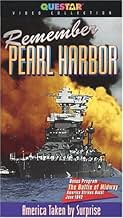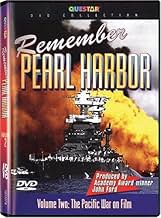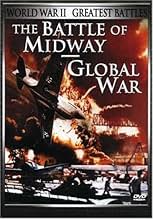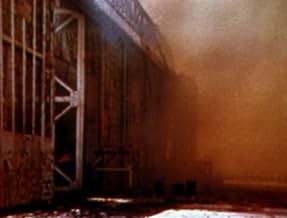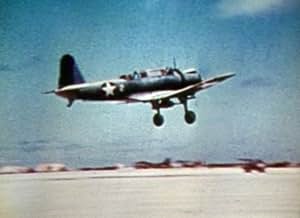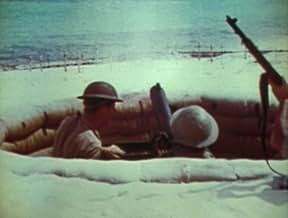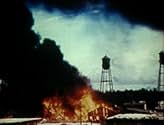IMDb रेटिंग
6.1/10
2.4 हज़ार
आपकी रेटिंग
अपनी भाषा में प्लॉट जोड़ेंThe Japanese attack on Midway in June 1942, filmed as it happened.The Japanese attack on Midway in June 1942, filmed as it happened.The Japanese attack on Midway in June 1942, filmed as it happened.
- निर्देशक
- लेखक
- स्टार
- 1 ऑस्कर जीते
- कुल 1 जीत
Henry Fonda
- Narrator
- (वॉइस)
Jane Darwell
- Narrator
- (वॉइस)
James Roosevelt
- Self - US Army Major
- (as Major Roosevelt)
Donald Crisp
- Main Narrator
- (वॉइस)
- (बिना क्रेडिट के)
Irving Pichel
- Narrator
- (वॉइस)
- (बिना क्रेडिट के)
Jimmie Thach
- Self - Naval Aviator
- (बिना क्रेडिट के)
फ़ीचर्ड समीक्षाएं
"The Battle of Midway" is an important historical film. Imagine...film crews were on the island when it was attacked and soon after rushed this short into theaters to celebrate this HUGE American victory. So, from a historical viewpoint it is an important film. BUT, and there is a but here, seen today the film isn't the wonderful film it was proclaimed to be when it was given an Oscar in 1943. I really think the Oscar purely came because of patriotism--Hollywood's attempt to bolster the war effort by heaping praise and awards on films that drummed up love of country and the war. Seen today, the color print is very faded and scratchy but more importantly the narrative sucks. The film was shot with color but was silent--and all sound effects and narration were added later-- and some of the voiceovers were terrible.
The bottom line is that if you want to see a historical document-- see this. If you want to see a good film that explains the battle well, don't! There are much better documentaries on the battle.
The bottom line is that if you want to see a historical document-- see this. If you want to see a good film that explains the battle well, don't! There are much better documentaries on the battle.
10llltdesq
This incredible compilation of footage won an Academy Award. It was shot by a crew of war cameramen that included John Ford, who I understand actually took some of the footage himself! While watching this, remember that you generally can effectively aim either a camera or a weapon at any one time, but not both and, as a cameraman has his eye to the lense while shooting, that means that he's exposed to all of the nasty stuff flying all around him with little or no cover! That's called "grace under pressure". They got an Oscar and deserved a medal! Highly recommended.
A documentary short, directed by John Ford. Covers the Battle of Midway, one of the most decisive battles of WW2. Taking place near the island of Midway in the central Pacific in June 1942, the battle turned the tide of the Pacific Theatre. Ford uses actual footage from the battle and the aftermath, with narration by Henry Fonda.
During WW2 the US used its mighty film industry to its advantage, producing high-quality news reels. documentaries and propaganda films. For this they enlisted some of the foremost directors of the age: Frank Capra, William Wyler, John Huston, John Sturges and John Ford, among others. Here, John Ford (or should I say, Lt. Commander John Ford, USNR) does his bit.
He does fairly well, capturing some great footage of the battle. It is more the editing and over-the-top, hammy added-on dialogue that weaken the film, and only when viewed with a 21st century lens. Propaganda films never have the same impact when viewed outside of wartime.
The movie went on to win the Best Documentary Oscar in 1943.
During WW2 the US used its mighty film industry to its advantage, producing high-quality news reels. documentaries and propaganda films. For this they enlisted some of the foremost directors of the age: Frank Capra, William Wyler, John Huston, John Sturges and John Ford, among others. Here, John Ford (or should I say, Lt. Commander John Ford, USNR) does his bit.
He does fairly well, capturing some great footage of the battle. It is more the editing and over-the-top, hammy added-on dialogue that weaken the film, and only when viewed with a 21st century lens. Propaganda films never have the same impact when viewed outside of wartime.
The movie went on to win the Best Documentary Oscar in 1943.
This short piece of film shows parts of, as the title already tells us, of the battle of Midway, and some moments after it. The director is John Ford and what he creates with this short documentary is pure Hollywood war propaganda. There is a storyline that even includes the women at home waiting for the fighters. During some scenes a dialogue between Jane Darwell and the great Henry Fonda is heard on the background.
The images of the battle, shot in color, have historic value and are pretty exciting. The heroic tone is easy to understand, although now it is easy to see past that. Everything, including its Oscar win, seems to be there for propaganda purposes, making the people at home feel good enough about the war that is going on. In the end 'The Battle of Midway' is an interesting little film, but not that much more.
The images of the battle, shot in color, have historic value and are pretty exciting. The heroic tone is easy to understand, although now it is easy to see past that. Everything, including its Oscar win, seems to be there for propaganda purposes, making the people at home feel good enough about the war that is going on. In the end 'The Battle of Midway' is an interesting little film, but not that much more.
This Oscar-winning documentary – by one of the most revered American film-makers who would have celebrated his birthday on the day I watched this – is quite celebrated, having even been treated to a 2-page spread in the early 1980s British periodical "The Movies". However, the passage of time has not been at all kind to it: not only, at just 18 minutes, does it not dwell in sufficient detail on the famous conflict that purportedly changed the course of the Pacific War
but the whole is lent the director's typically homespun – read sappy – approach, which really dates it! The film obviously retains historical value for its rare colour footage of the battle (some of which was actually incorporated in the star-studded 1976 Hollywood rendition of these same events, MIDWAY!) and, for the record, Ford regulars Henry Fonda and Jane Darwell supply the intermittent narration.
क्या आपको पता है
- ट्रिवियाDirector John Ford and cinematographer Joseph H. August were wounded by enemy fire while filming the battle.
- भाव
Main Narrator: Midway Island. Not much land right enough, but it's our outpost. Your front yard.
- कनेक्शनEdited into Ils ont filmé la guerre en couleur (2000)
- साउंडट्रैकAmerica, My Country Tis of Thee
(1832) (uncredited)
Music by Lowell Mason, based on the Music by Henry Carey from "God Save the King" (1744)
Words by Samuel F. Smith
Played in the score and later sung by an offscreen chorus
टॉप पसंद
रेटिंग देने के लिए साइन-इन करें और वैयक्तिकृत सुझावों के लिए वॉचलिस्ट करें
विवरण
- चलने की अवधि
- 18 मि
- ध्वनि मिश्रण
- पक्ष अनुपात
- 1.37 : 1
इस पेज में योगदान दें
किसी बदलाव का सुझाव दें या अनुपलब्ध कॉन्टेंट जोड़ें


